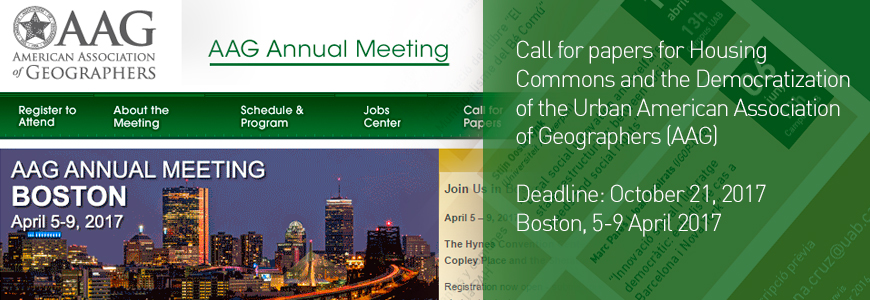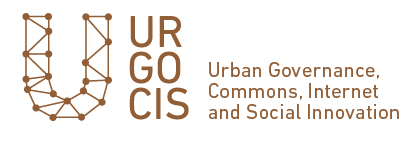by Marc Parés | febr. 2, 2018 | Democràcia Urbana, Notícies
Recentment han sortit dues publicacions derivades del projecte SOCRISIS (www.socrisis.net) a partir de l’estudi de quatre iniciatives socialment innovadores a les àrees urbanes de Nou Barris Nord i Sants de la ciutat de Barcelona. Els dos articles, un en català i l’altre en anglès, analitzen els processos de canvi social duts a terme a través d’experiències d’innovació social tot posant el focus en la dimensió territorial (les característiques històriques i geogràfiques dels barris on emergeixen aquestes iniciatives) i l’agència col·lectiva (a través de l’estudi de diferents pràctiques de lideratge democràtic). Aquí teniu les referències:
- Eizaguirre, S.; Parés, M. 2018. “Communities making social change from below. Social innovation and democratic leadership in two disenfranchised neighbourhoods in Barcelona”. Urban Research and Practice [ Online ]
- Eizaguirre, S.; Parés, M. 2018. “La dimensió territorial de la innovació social: una mostra de pràctiques de lideratge col·lectiu a Nou Barris Nord i Sants” Documents d’Anàlisi Geogràfica 64(1): 5-24 [ Descarrega ]
by Marc Parés | maig 10, 2017 | Democràcia Urbana, Notícies
El grup de recerca URGOCIS ha quedat en primera posició de la convocatòria DEMOC de projectes de recerca de l’AGAUR d’enguany amb el projecte COPHAB: Coproducció i gestió participativa d’habitatge: iniciatives socials, capacitats comunitàries i instruments de política pública. L’equip de recerca està format per Marc Parés (IP), Mara Ferreri, Joan Subirats, Natàlia Rosetti, Ricard Gomà, Ángela García-Bernardos i Albert Terrones. El finançament concedit és de 10.600€ i el projecte s’executarà entre els anys 2017 i 2018.
L’accés a l’habitatge ha esdevingut una qüestió de gran rellevància política després de la crisi financera global de l’any 2008. En un context on els poders públics han vist afeblides les seves capacitats d’intervenció en aquest àmbit, hem vist com a Catalunya s’han multiplicat les iniciatives socials que pretenen donar resposta a aquesta problemàtica. El projecte COPHAB es centra en l’anàlisi d’aquelles iniciatives socials que tenen a veure amb la coproducció i la gestió participativa d’habitatge a Catalunya. Ens interessarem, en primer lloc, per les diferents formes de coproducció i gestió participativa d’habitatge accessible a Catalunya, identificant les iniciatives existents i analitzant-ne les seves característiques. Centrarem la nostra recerca al voltant de tres dimensions analítiques: la qualitat democràtica, l’impacte social i l’escalabilitat de les iniciatives. En segon lloc, ens interrogarem sobre les barreres que obstaculitzen aquest tipus d’iniciatives socials i sobre les capacitats que faciliten el seu desenvolupament. Per assolir aquests objectius elaborarem una cartografia de les iniciatives de coproducció i gestió participativa d’habitatge a Catalunya i analitzarem en profunditat tres casos d’estudi incrustats en els seus respectius contextos institucionals i territorials. Com a resultat final s’editarà una Guia amb una sèrie de recomanacions per orientar tant les polítiques públiques dels governs locals com les pràctiques d’organització i funcionament de les mateixes iniciatives.

by Marc Parés | oct. 17, 2016 | Activitats, Democràcia Urbana, Notícies
Call for papers for Housing Commons and the Democratization of the Urban American Association of Geographers (AAG) – Boston, 5-9 April 2017
CFP: Housing Commons and the Democratization of the Urban
Organizers: Marc Parés & Mara Ferreri, Institute for Government and Public Policy, Universitat Autònoma de Barcelona
Deadline for proposals: October 21, 2016.
In the context of the post-2008 global financial crisis, housing has once again become a key issue of contention and a focus of social movement organizing in cities across the world. Calls have been made for re-centering the role of housing within the wider analysis of capitalist political economy (Aalbers and Christophers 2014), at the same time as housing access is formulated again as a fundamental urban right.
From a growing critique of the impact of financialisation on housing and everyday life (García-Lamarca and Kaika 2016; Fields and Uffer 2016), forms of organising have developed to address both the rise of evictions and housing marginalisation, and to propose alternatives. The framework of commons and commoning has been proposed both to understand long-standing dynamics of urban enclosures (Sevilla-Buitrago 2015; Hodkinson 2012) and to examine proposals by movements, organisations and institutions to rethink housing provision, ownership and management.
This session seeks to explore, theoretically and empirically, different conceptualisations of ‘housing commons’ as well as socially innovative responses and institutional arrangements around access to housing. An expanded definition of ‘housing commons’ would include housing as a collectively shared material urban resource (cooperatives, Community Land Trusts and other tenures) but also as (immaterial) relations and collective practices that respond to emerging housing issues. We especially seek contributions on the question of housing in relation to new urban grassroots movements, ownership regimes, governance modes as well as new forms of co-production and participation in housing policy-making. Papers examining old and new demands and practices of housing commoning are also welcome.
Papers might explore, but not be limited to:
- housing ‘crises’ in the context of urban commons
- geographies of historic and new enclosures of housing commons
- typologies and challenges of housing commons and commoning
- housing-based social movements and their demands
- socially innovative responses for guaranteeing housing access
- institutional arrangements and legal tools for the governance of housing commons
- innovation in planning and ownership regimes in relation to housing
- …
If you are interested in participating in the session, please send a title, your affiliation and a short abstract of no more than 250 words to both Marc Parés (marc.pares@uab.cat) and Mara Ferreri (mara.ferreri@uab.cat) by 21 October 2016. Please follow AAG guidelines for preparing and submitting abstracts at: http://www.aag.org/cs/annualmeeting/call_for_papers.
References
[tp no_translate=”y”]Aalbers, Manuel B., and Brett Christophers. 2014. ‘The Housing Question under Capitalis Political Economies’. Housing, Theory and Society, no. 31: 422–28.
Fields, Desiree, and Sabina Uffer. 2016. ‘The Financialisation of Rental Housing: A Comparative Analysis of New York City and Berlin’. Urban Studies 53 (7): 1486–1502.
García-Lamarca, Melissa, and Maria Kaika. 2016. ‘“Mortgaged Lives”: The Biopolitics of Debt and Housing Financialisation’. Transactions of the Institute of British Geographers 41 (3): 313–27.
Hodkinson, Stuart. 2012. ‘The New Urban Enclosures’. City 16 (5): 500–518.
Sevilla-Buitrago, Alvaro. 2015. ‘Capitalist Formations of Enclosure: Space and the Extinction of the Commons’. Antipode 47 (4): 999–1020.[/tp]

by Marc Parés | oct. 13, 2016 | Activitats, Democràcia Urbana, Notícies
Mara Ferreri s’incorpora com a investigadora postdoctoral a l’URGOCIS
El Grup de Recerca URGOCIS (Research Group on Urban Governance, Commons, Internet and Social Innovation) ha incorporat una nova investigadora postdoctoral, Mara Ferreri, mitjançant el programa P-Sphere de la UAB, finançat per la convocatòria COFUND de les Accions Marie Sklodowska -Curie de la Unió Europea. Durant els propers 3 anys Ferreri desenvoluparà el seu projecte d’investigació en l’IGOP sobre moviments socials i polítiques públiques al voltant de l’habitatge com a bé comú, comparant Espanya i el Regne Unit.
Mara Ferreri és una investigadora que treballa en els camps de la geografia urbana, cultural i política. El 2013 es va doctorar en Geografia per la Queen Mary University of London, amb un tesi sobre les polítiques de reutilització temporal d’espais buits. Els seus interessos i temes de recerca inclouen: urbanisme temporal, precarietat, gentrificació, cartografia crítica, organització i autogestió, i dret a l’habitatge. El seu treball ha estat publicat en diverses revistes internacionals (Cities, Antipode, Ephemera: Theory & Politics in Organization) i en volums editats, com Space, Power and the Commons (Routledge, 2016) i Cities Interrupted: Visual Cultures and Urban Space (Bloomsbury , 2016). Abans d’arribar al IGOP ha realitzat investigació i docència en Geografia i Metodologia de les Ciències Socials a la Queen Mary, London School of Economics i a la Durham University.



